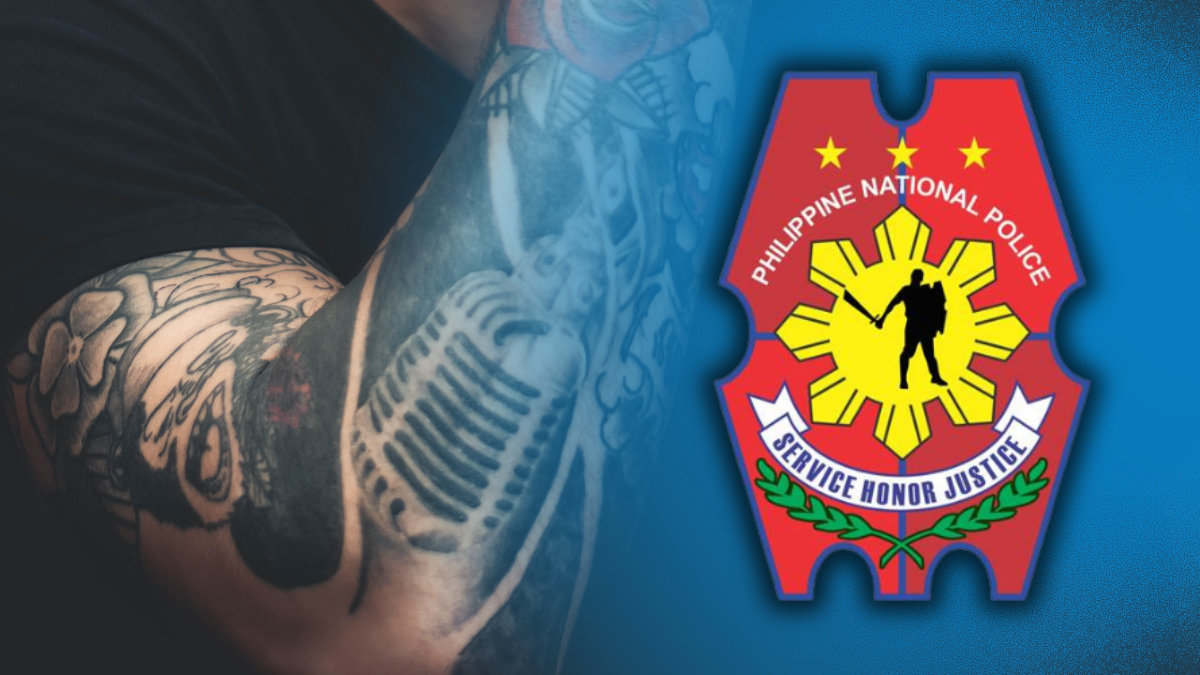
INQUIRER FILE PHOTO
MANILA, Philippines — The Philippine National Police (PNP) policy requiring police officers and even cadets to remove visible tattoos is discriminatory and may even be considered unconstitutional, Manila 3rd District Rep. Joel Chua said on Wednesday.
Chua, in a statement, said there is no basis for the PNP’s memorandum, noting that such a policy is not stated in Republic Act No. 6713, the Code of Conduct and Ethical Standards for Public Officials and Employees, and R.A. No. 6975, the Department of the Interior and Local Government Act of 1990, which created the police service.
Furthermore, the lawmaker said tattoos are part of free expression as an art.
READ: NCRPO open to cops with tattoos
“The new policy of the PNP regarding tattoos has no basis in law. It is not in the Code of Conduct and Ethical Standards for Public Officials and Employees (RA 6713). It is also not in the law that established the Philippine National Police (RA 6975),” Chua said.
“The PNP should discard that policy now before they get into legal trouble for the unconstitutionality of their policy. Tattoos are an art form of expression. The Constitution protects freedom of expression. By all indications, the PNP policy on tattoos is unconstitutional,” he added.
According to Chua, the only possible reason to discriminate against officers with tattoos is if the tattoo signifies membership in an active criminal organization. However, the lawmaker stresses that participation in such organizations should be proven first, noting that tattoos cannot be used to discriminate against previously convicted individuals.
“It is the membership in the criminal organization that must be proven first. Tattoos are not probable cause for that–not even membership in jail gangs because it is the criminal activity that must be proven to actually exist, not the mere presence of the tattoos,” he explained.
“Tattoos cannot even be used to discriminate against former convicts who have served their sentences in jail because our laws advance restorative justice and integration into society of ex-convicts. Tattoos should not be used as indirect indicators of possible criminal behavior,” he added.
Last Monday, PNP spokesperson Col. Jean Fajardo said the police leadership has issued Memorandum Circular 2024-023 this March 2024, requiring all personnel with existing tattoos to provide a written affidavit declaring their tattoos and while having the visible ones removed.
The policy applies to all PNP personnel and even cadets in the Philippine National Police Academy.
Fajardo said the PNP leadership pushed for the memorandum after observing that the tattoos of some personnel are already showing up on their arms and other parts not covered by their uniforms.
Three months would be given for the tattoo removal, while administrative charges will be filed against those who refuse to comply after the three-month period.
But Chua believes people with tattoos are only disqualified in one area: donating blood.
The lawmaker said the Philippine Red Cross’s rule now allows people who got their tattoos at least a year ago to donate blood.
“The only rule I know of that includes tattoos as disqualification is for blood donation. Recent tattoos not more than one year disqualify the applicant from giving blood, but if the tattoo is more than one year ago, the blood donor may give blood,” he said.
“Requiring police officers to remove their visible tattoos also exposes those officers to health risks such as infection. Tattoo removal is safe only if it is done by licensed healthcare practitioners with specific training and certification in tattoo removal,” he added.
Chua also noted that even the Supreme Court allows judges to have tattoos if they permit it.
“It is not in the qualifications and disqualifications stated in Section 30 of RA 6975. Not even the Supreme Court prohibits its judges from having tattoos, as contained in its decision on an administrative case about the social media posts of a judge in La Union,” he said.
“It is disappointing that our PNP has this negative mindset about people with tattoos. Tattoos have nothing to do with the job performance of any police or public servant,” he added.
The PNP’s recent policy contrasted with a previous official’s openness to accepting recruits with tattoos. In 2018, Metro Manila’s former top cop Oscar Albayalde—who eventually became PNP chief—said he was open to a review of the ban on applicants with tattoos.
Albayalde said it could be applied on a case-by-case basis as some tattoos were “considered art” — like prospective recruits who have the name of their wife or girlfriend tattooed on their chests.